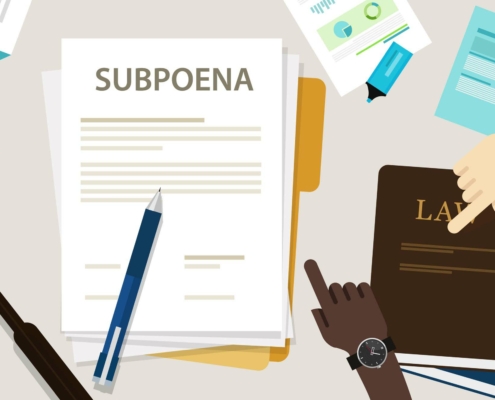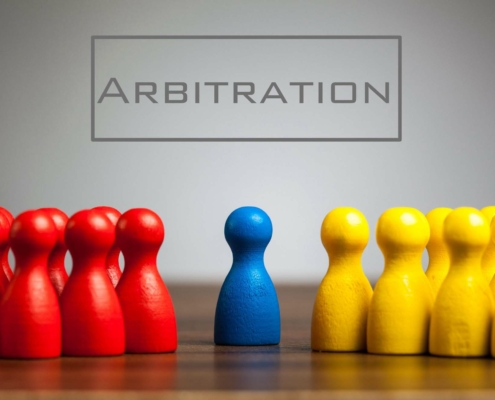Exploring the Intricacies of Compelling Arbitration
More frequently in today’s civil litigation, the strategy of compelling arbitration emerges as an increasingly relevant topic. Although often perceived as less exciting than, say, a blockbuster movie script, the realm of compelling arbitration holds significant importance, especially in a scenario where the legal landscape is continuously evolving.
The California Perspective on Arbitration
In California, public policy strongly endorses arbitration as an efficient and cost-effective method for resolving disputes. This is evident from various legal precedents, such as the case of Brodke v. Alphatec Spine Inc. (2008), which highlights the state’s inclination towards arbitration. The fundamental provisions for compelling arbitration, while straightforward, come with their nuances and potential complexities that require careful navigation.
Diverse Types of Arbitration Agreements
Arbitration agreements can be diverse, each catering to specific sectors or circumstances. Here’s a closer look at the four main types you might encounter:
Arbitration clauses in employment contracts have become increasingly common, offering an alternative method for resolving disputes between employers and employees. These clauses typically stipulate that any disagreements arising from the employment relationship, such as those related to termination, discrimination, or wage disputes, will be resolved through arbitration rather than through traditional court litigation.
Arbitration clauses in employment contracts provide a quick and cost-effective alternative to traditional litigation for resolving employment disputes, including issues like termination, discrimination, or wage disagreements. California employer class action defense attorney often make a motion to compel arbitration to defeat the class certification.
Arbitration clauses often restrict employees’ rights to participate in class-action lawsuits and limit the ability to appeal arbitration decisions, emphasizing the need for a clear understanding of their implications in the employment context.
Construction Contracts
Common in contracts between general contractors and owners, as well as in various subcontracts in large projects. Certain contracts with government entities in this sector are guided by the Code of Civil Procedure section 1296.
- Medical Malpractice Arbitration
A notable example is the arbitration provision used by Kaiser for medical care. Arbitration clauses are now a standard in many hospitals and medical care providers’ consent forms and other documents. These are governed by the Code of Civil Procedure section 1295.
- General Contractual Agreements
Arbitration provision are ubiquitous in a variety of contracts, ranging from the simple, like a contract for installing a light fixture, to the complex, such as multimillion-dollar business purchase agreements. Settlement agreements often include arbitration clauses, either for enforcing specific provisions or for the entire settlement.
- Uninsured/Underinsured Motorist Claims
These involve first-party claims in scenarios where motorists are uninsured or underinsured. Governed by the policy’s arbitration provisions and the Insurance Code section 11580.2, subdivision (f).
Petitions to compel arbitration
The process of compelling arbitration is an integral part of dispute resolution in contracts. This article delves into the detailed procedures and legal requirements for compelling arbitration, as governed by the Code of Civil Procedure section 1280 et seq.
Commencement of the Arbitration Process
- Time Frame for Filing: The initiation of a petition to compel arbitration is time-sensitive. It begins when one party refuses to arbitrate, triggering a four-year statute of limitations based on written contract law (Spear v. California State Automobile Association, 1992).
Notification and Service Procedures
- Service of Petition: The Code of Civil Procedure section 1290.4 outlines the service of the petition. This includes serving a copy of the petition, notice of hearing, and related papers as specified in the arbitration agreement.
- Alternative Service Requirements: If the arbitration agreement does not specify service procedures, section 1290.4, subdivision (b) provides guidance.
- Minimum Notice Period: A minimum of 10 days’ notice before the hearing of the petition is mandated by Code of Civil Procedure section 1290.2.
Jurisdictional and Venue Considerations
- Monetary Thresholds: For cases with an amount in controversy under $25,000, file as a limited civil case (Code Civ. Proc., § 86, subd. (a)(10)). If it exceeds $25,000, it should be filed as an unlimited case (Code Civ. Proc., § 32.5).
- Personal Jurisdiction in California: Arbitration agreements made in California are subject to the personal jurisdiction of California courts (Code Civ. Proc., § 1293).
- Venue Selection: The venue for filing the petition depends on where the contract was made, with specific provisions for contracts made outside California (Code Civ. Proc., § 1292).
- Filing in Ongoing Lawsuits: If a lawsuit involving an arbitrable issue is already in progress, file the petition in that action (Code Civ. Proc., § 1292.4).
Essential Allegations in the Petition
- Requirement of a Written Agreement: The petition must clearly state the existence of a written agreement for arbitration and a refusal to arbitrate by a party (Code Civ. Proc., § 1281.2).
- Detailed Allegations: It should include verbatim provisions from the agreement, or attach a copy, and indicate any refusal to arbitrate (Mansouri v. Superior Court, 2010).
- Refusal to Arbitrate: A filed lawsuit by the responding party is considered a refusal to arbitrate (Hyundai Amco America, Inc. v. S3H, Inc., 2014).
Judicial Considerations and Waiver
- Mandatory Arbitration Order: The court must order arbitration if all requirements are met, unless certain exceptions apply (Code Civ. Proc., § 1281.2).
- Exceptions to Arbitration: These include waiver by the petitioner, grounds for rescission of the agreement, potential for conflicting rulings, or fraudulent creation of the agreement by a depository institution.
- Waiver Standards: Waiver of the right to arbitrate is not easily inferred and requires substantial proof (Burton v. Cruise, 2010).
Tolling in the Context of Arbitration
In the arbitration process, the concept of tolling plays a crucial role, particularly under the Code of Civil Procedure section 1281.12.
- Effect of Civil Action on Time Limitations: If an arbitration agreement sets a timeframe for demanding or initiating arbitration, the commencement of a civil action based on the controversy tolls these time limitations, as per Code of Civil Procedure section 1281.12.
Responding to Arbitration Petitions
- Filing a Response: Named respondents in a petition have the right to file a response (Code Civ. Proc., § 1290).
- Consequences of No Response: Failure to respond to a petition results in the admission of the petition’s allegations (Code Civ. Proc., § 1290; Main v. Merrill Lynch, 1977).
- Timeframe for Response: The timeline for filing a response is set by Code of Civil Procedure section 1290.6 and complements section 1290.4.
Priority and Expediency in Arbitration Proceedings
- Preference in Court Scheduling: Courts are required to prioritize petitions to compel arbitration (Code Civ. Proc., § 1291.2).
- Hearing Process: Arbitration hearings are conducted summarily with at least 10 days’ notice, following the same procedures as for motions (Code Civ. Proc., § 1290.2).
Granting Petitions and Judicial Discretion
- Mandatory Granting with Exceptions: Courts must grant petitions unless specific conditions under Code of Civil Procedure section 1281.2 are present.
- Discretion in Complex Litigation: Courts have discretion in cases involving overlapping non-arbitrable issues or multiple parties (Code Civ. Proc., § 1281.2, subd. (d)).
- Denial in Cases Involving Third Parties: A petition can be denied if non-arbitrable issues involve a third party not bound by the arbitration agreement (Laswell v. AG Seal Beach, LLC, 2010).
- Handling Mixed Claims: In scenarios where only some parties have an arbitration agreement, courts can opt not to compel arbitration, instead consolidating all parties in a single action (Mercury Insurance Group v. Superior Court, 1998).
Arbitrating With Some Defendants While Proceeding to Trial With Others
- Dual Paths for Different Defendants: Code of Civil Procedure section 1281.4 allows for simultaneous arbitration and trial proceedings involving different defendants in the same controversy.
- Case Example: In Cuevas v. Truline Corporation (2004), a unique situation arose where a plaintiff proceeded to arbitration against some defendants and to trial against others in a case involving a catastrophic injury. This case highlights the flexibility of the legal system in handling complex disputes involving multiple parties and different legal actions.
Simultaneous Arbitration and Trial Proceedings
- Procedure for Overlapping Legal Actions: According to Code of Civil Procedure section 1281.4, if a controversy is ordered to arbitration and there is a pending action or proceeding in a California court, the court must stay the action or proceeding until the arbitration concludes, or until an earlier court-specified date.
- Application in Multi-Party Disputes: This provision allows for arbitration against some parties while continuing trial proceedings against others, as demonstrated in the Cuevas v. Truline Corporation case.
Strategies to Avoid Arbitration in Litigation
Arbitration, a common clause in many contracts, often necessitates intricate legal strategies for those wishing to avoid it. This comprehensive guide covers various approaches and legal provisions related to avoiding arbitration, consolidating multiple arbitration proceedings, filing petitions, appealing decisions, and special arbitration provisions.
- Dismissing Lawsuits with Arbitrable Clauses: If a lawsuit contains both arbitrable and non-arbitrable clauses and a petition to compel arbitration is granted, plaintiffs can dismiss their lawsuit without prejudice (Code of Civil Procedure section 581). They can then refile without the arbitrable claims, avoiding a stay under Code of Civil Procedure section 1281.4 (Cardiff Equities, Inc. v. Superior Court, 2008).
Consolidating Arbitration Proceedings
- Criteria for Consolidation: Under Code of Civil Procedure section 1281.3, courts can consolidate multiple arbitration proceedings if they involve the same parties or related transactions, and there are common legal or factual issues.
- Exclusions and Procedures: This section also details the selection of arbitrators and addresses conflicting arbitration provisions but does not apply to medical malpractice disputes under section 1295.
Filing a Petition Instead of an Answer
- Defendant’s Option to Compel Arbitration: Defendants have the option to file a petition to compel arbitration in place of an answer to a complaint, with a 15-day period to plead post any denial (Code Civ. Proc., § 1281.7).
Appealing Arbitration Decisions
- Grounds for Appeal: Code of Civil Procedure section 1294 outlines the appeal process for denied petitions, dismissal of petitions, vacated awards, or judgments pursuant to these provisions.
- Options for Immediate Relief: While orders compelling arbitration are not typically appealable, immediate relief can be sought through a writ (State Farm Fire and Casualty Company v. Harden, 1989; La Pietra v. Freed, 1978; International Film Investors v. Arbitration Tribunal of DGA, Inc., 1984).
Voiding Arbitration Provisions for Non-Payment
- Breach for Non-Payment of Fees: In scenarios where the drafting party of an arbitration agreement in employment or consumer cases fails to pay fees, they are in material breach. This allows the non-drafting party to choose between withdrawing from arbitration or continuing (Code Civ. Proc., sections 1291.97, 1291.98, and 1291.99).
Special Provisions for Certain Types of Arbitration
- Medical Malpractice and Motorist Claims: Specific guidelines exist for medical malpractice actions (Code Civ. Proc., § 1295) and uninsured/underinsured motorist claims (Insurance Code section 11580.2).
- Construction Contracts with Public Agencies: Code of Civil Procedure section 1296 specifically addresses construction contracts involving public agencies.
Requesting a Statement of Decision
- Basis for Appeal: Parties can request a court to issue a statement of decision before submitting a motion to compel arbitration. Failure to issue such a statement can be grounds for appeal (Métis Development LLC v. Bohacek, 2011).
Closing Thoughts on the Importance of Arbitration Knowledge
Despite perceptions of the subject’s dryness, understanding arbitration is crucial, especially given the current challenges in accessing jury trials. The reality of delayed justice underscores the importance of arbitration, including emerging formats like Zoom arbitrations, as vital avenues for achieving timely justice for clients.
In summary, this comprehensive overview of arbitration-related strategies, procedures, and special provisions reveals the complexity and significance of arbitration in the legal landscape. From tactical dismissals to consolidating proceedings and navigating the appeals process, these guidelines serve as a crucial resource for legal professionals. They highlight the need for astute legal maneuvering and a deep understanding of arbitration laws to effectively advocate for clients’ interests. As the legal system continues to evolve, particularly with the increasing reliance on virtual platforms, the role of arbitration becomes ever more critical in ensuring that justice is both served and accessible.






















 By: Brad Nakase, Attorney
By: Brad Nakase, Attorney





